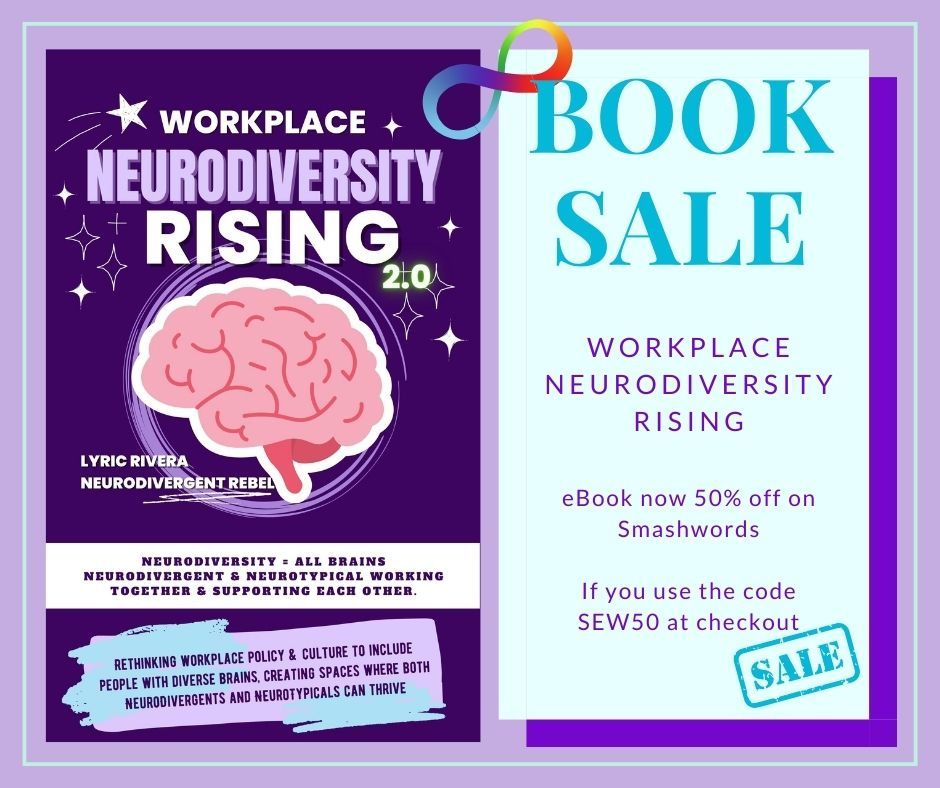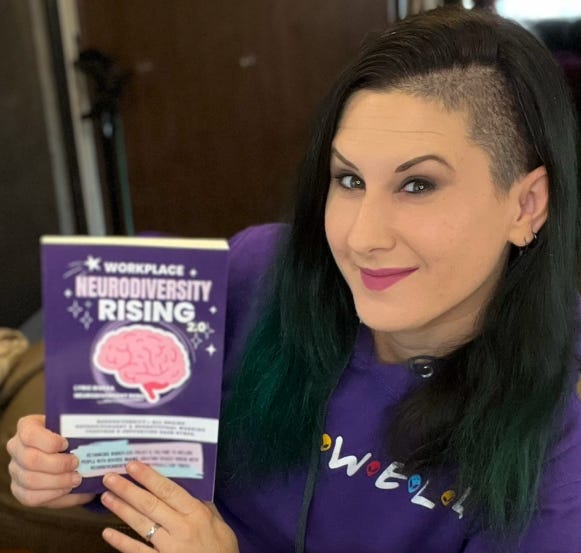NeuroDivergent Employment is Just ONE Problem We Need to Correct to Make a More Neuro-Inclusive World
Some NeuroDivergent People will never work, not because they do not want to, but because they cannot.
Last month I shared the first preview of my new book on NeuroDiversity in the wider world (title coming soon).
This is a continuation of the series previewing that book (which I hope to get out in the next year or two). I plan to continue to share this book with my subscribers here on Substack as I am writing it.
As it stands I am 45 pages and 16,829 words into my first draft (which I aim to be about 30-40k words).
I would like to thank my subscribers and supporters for making both this blog, and this book possible.
Solutions to Our Societal Problems
While some physical changes required to make the world more accessible for NeuroDivergent People could incur monetary costs, much of what needs to be done to make the world more inclusive for people of all brain types (or Neuro-Inclusive) costs very little (or is hard to quantify monetarily).
Perhaps the lack of a price tag is an obstacle for some who (are used to throwing money at things) want to ask, "How much will it cost to solve the problem?" However, this venture (of global Neuro-Inclusion) does not deal in dollars but in community-driven grass-roots aim and effort to humanize and increase understanding in the broader world around the needs and differences among neuro-minority members.
Money could aid our efforts to improve the world, as money has played an enormous part in our harm and stigmatization. Still, money alone cannot solve the problems that plague NeuroDivergent (and all people), as the current capitalist systems (that value working ability and reliable productivity) are a significant part of the problem.
Financial Obstacles
Some NeuroDivergent People will never work, not because they do not want to, but because they cannot. Many of us struggle to gain or maintain full-time employment.
Some of us will work and may hold high-level executive-level leadership roles, best-selling authors, musicians, and artists, or become members of the rich and famous. Still, these NeuroDivergent People are the exception, NOT the rule.
In reality, many NeuroDivergent People live in poverty, and many of us are also under or unemployed, causing us to struggle to get even our most basic needs (like food, housing, and healthcare) met.
When we have multiple NeuroTypes or additional co-occurring differences or disabilities, it can increase the likelihood that we will struggle in life, especially if our differences are incompatible with capitalist structures, like shift work or the traditional 40+ hour work week.
The workplace problem (struggling to find suitable equitable employment that pays a living wage) is one of the most significant obstacles many NeuroDivergent adults face.
Too many of us are stuck in workplaces that burn us out, leaving us in survival mode.
One can become burned out and stuck in survival mode, as I was before being diagnosed Autistic (8 years ago at the time of writing this).
When I was burned out by the world, all I did was work and recover from work (by resting at home). I stopped going out and spending time with people who cared about me. I'd become like a cellphone in "energy conservation mode," doing the bare minimum I could for survival.
I didn't socialize or engage in my hobbies (or anything that brought joy to my life) because I had no energy.
Left isolated and without any meaning (other than working for survival), I eventually couldn't help but fall into the thought pattern of, "What is the point of working so hard" (having to spend all my spare time building energy to work) "but having no energy left to live"?
In the time of not knowing myself (when I didn't yet know I was Autistic), the struggles I faced with my employer seemed impossible to overcome.
Everything began to feel hopeless.
No end was in sight, and I started plotting my possible escapes. One escape (the final escape) became so alluring that it scared me because this escape seemed the most achievable to me (before being diagnosed, Autistic saved my life).
Learning the truth about my brain set me free, releasing me from the blame I'd placed on myself for struggling.
Before being diagnosed Autistic, I was convinced that all the changes had to come from me (viewing myself as one giant project). However, being given the word Autistic to describe myself changed my life because it helped me realize something:
I needed to be more firm in asking the people around me to change instead of doing all the work changing myself (because much of what I was trying to change about myself couldn't be changed). This included my employer.
Employers Need to Change
When I was diagnosed Autistic, the employer I had was not willing to flex their systems to meet my needs, so I left that employer in favor of one that would meet me where I was.
My next job, the one I took knowing and disclosing early on that I was Autistic, was the best job I ever had working for someone else and the only time in my life I've been employed at a truly livable wage (since I started working at the age of 11).
Part of what made this job so amazing, besides being paid fairly, was that they helped me fit into a role molded around my abilities, which utilized my strengths while respecting my weaknesses (which helped as I started my burnout recovery journey).
Additionally, when I had a need (like to work from home or use an advanced grammar and spell-checking tool) that was not (yet) standard for the organization, my new employer responded with curiosity, asking HOW (instead of pushing back), demonstrating a willingness to make what I needed available not only to me but also to anyone else on the team who wanted it (so my needs weren't singled out).
My new employer, The Consulting Firm, also trusted me about what I said I needed to be successful and didn't demand I get a doctor's recommendation to back up every request I made.
It was the best workplace I've ever experienced. Unfortunately, it ended in the fall of 2020, when the strain of the global pandemic began to weigh on the small consulting firm that had restored my faith in the way business could be done (honestly, with compassion, and in a way that respects the human dignity of its people).
I cried when I was let go, and my boss and our Ops person cried during the Zoom call, too. We brought humanity and love back to the workplace.
Neuro-Inclusive People-Centric Workplaces & Employers' Support: The Key to Our Success
Because most workplace environments are hostile to NeuroDivergent People, many of us find ourselves stuck in survival mode or locked out of equitable employment (unless we're given the freedom to change things and support when we speak up about workplace changes that need to be made).
Looking at workplaces, the changes that need to be made in that area could fill multiple books. That's why I wrote my first book, Workplace NeuroDiversity Rising, creating a short, concise summary with actionable steps one can take to enact the changes that need to be made within workplace systems to make them more inclusive for Neuro-Minorities.
The solutions I will review in my next NeuroDiversity book (and on Substack in the coming weeks) will be relevant to ALL spaces (including workplaces) but not specific to workspaces.
If you're curious about some specific workplace modifications that could be implemented (many with little to no cost), check out Workplace NeuroDiversity Rising, named "Trend for 2023" and praised in Forbes as "an excellent 'how to manual' based on lived experience and professional competence," (found online at www.books2read.com/neurodiversity-rising).
The eBook version of Workplace NeuroDiversity Rising is available for half price through January 1, 2025, as part of Smashwords's End of Year Sale (when you use the code SEW50 at checkout).

MORE INFO:
Know someone who would benefit from reading this? You can help by:
What would you like to learn about?
Please, let me know in the comments below what questions you have or if you have another idea/topic you're curious about for a future article.







I wanted to mention that a lack of references from past employers will bar most autistics from being able to work.